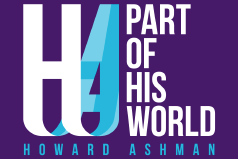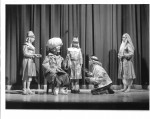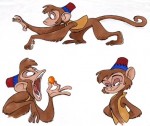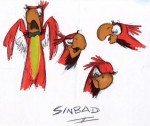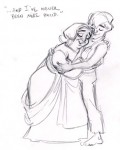John Musker Question Countdown - Number 9
John Musker here with question #9 in our countdown: “This is a tricky one. How different would Aladdin have turned out had Howard lived? Did Howard ever write a screenplay or did Linda Woolverton write the original draft?”
This is almost impossible to answer. Based on our work with Howard on Little Mermaid, he would have been extremely involved, would have come up with all sorts of ideas and would have had strong opinions about everything. Howard was very sick during our production of Aladdin. He died a year and a half before its release and, as I recall, he never saw any animation on it, unless possibly we brought some early test animation for him to view at his home in New York. He never came to California during its production.
Howard’s early involvement with Aladdin has been documented elsewhere but let me shorthand it for those who may not know.
Howard was intrigued with doing live action as well as animation with Disney. Little Mermaid was his first choice of a film to work on but Howard talked to me a bit about a live action picture, too. He had gotten the studio to option the rights to Tina Turner’s autobiography, I Tina, which finally made its way to the screen in 1993, a year after Aladdin. What’s Love Got to Do With It was notable for Angela Bassett’s great performance as Tina and Laurence Fishburne’s turn as her husband, Ike. Howard wrote a first screenplay for the film but it wasn’t the screenplay that was eventually shot. Talk about the “lost Howard” stuff, I’m really intrigued about what he would have done with this, dealing with things that clearly resonated with him: raise the roof R&B, a strong central female character trying to get control of her life, and bad behavior by some of those around her.
For his next animation picture, Howard proposed Aladdin. I seem to recall he may have been in a children’s theater production, do I have that anywhere near right, Sarah?
[Sarah here: You’re right, alright. Here’s a photo of Howard as Aladdin proving the point. Note the spiffy costumes]
Howard wrote a long treatment, about 40 pages, outlining story and characters. He wrote a number of songs for that version with Alan Menken, only two of which made it into the finished movie. Howard envisioned Aladdin as a breezy Hope/Crosby musical, tongue firmly in cheek throughout. There was a villainous nameless evil Wazir, a parrot sidekick named Sinbad, a shallow, spoiled, materialistic Princess named Jasmine, and the truer romantic interest for Aladdin: a Judy Garland-y tomboy whose charms Aladdin fails to fully notice. Aladdin also had a mom and a group of funny pals: Babkak, Omar, and Kassim.
The film was set in a Hollywood-ized Baghdad. And there were two genies, the “Genie of the Ring” who sang “Arabian Nights” and the “Genie of the Lamp” who was a Cab Calloway-esque sly showman and who was African American, which reminds me of something Howard once told me.
He said he had two rules he tried to follow in the construction of some of his musicals. With songs, Never go slow, when you can go fast… He worried about the holding power of slower tempo ballads, and talked about hearing the dreaded sound of, “program rattling” in the theater, a surefire indicator the audience was losing interest.
The other rule was: Never go white when you can go black. Howard loved the power, emotion and expressiveness he felt so many black singers brought to the stage and writing material for them was irresistible to him. Thus, his genie was black, as were his plant and chorus in Little Shop and Tina Turner beckoned from the live action world.
[Sarah here again: I will admit that I hesitated about keeping this in. Mostly because I am concerned that somehow, someone will be offended by this. Then I decided that what the hell, this is so totally Howard. Howard was a great fan of African American musicians and music – it’s actually something he shared with our Dad. Howard was beside himself when as a teen, he managed to get tickets to the Ike And Tina Turner Review when it toured Baltimore, and even more stunned when as an adult he had the chance to interview the great Ms Turner herself. Could have picked him up off the floor when he got a Christmas card from her that year. And his Little Shop urchins were of course his tribute to the great black girl groups of the sixties. Back to you, John.)
While Ron Clements and I were deep in the production of Little Mermaid, Howard was developing Aladdin. I believe Howard envisioned writing and directing it himself, which would have been fascinating to see. Howard had issues with his creative work being interfered with by others. I think Smile, his stage musical, was a case in point, a project over which he felt he lost control. Although he never expressed this directly to me, I suspected there were things about Mermaid’s process that frustrated him and that he would have done differently. Aladdin was an opportunity for him, I believe, to try and shape an animated film more personally. Ironically, as Aladdin moved into development at Disney, Howard became less involved as Jeffrey Katzenberg and others pushed it in different directions.
There were scripts written by others that were generated from Howard’s treatment but they apparently weren’t well received. Roy Disney was concerned with a genie who bordered on being a slave being portrayed by a black actor. Disney had also purchased remake rights to Alexander Korda’s Thief of Baghdad. By the time we were finished with Mermaid, Aladdin had a screenplay penned by Linda Woolverton that had a Thief of Baghdad-like villain named Jaf’far, an aged sidekick retired human thief named Abu, and a human handmaiden for the Princess. It also had no songs, and certainly no spot for any of the ones Howard had written.
When Ron and I picked Aladdin to do as a follow up to Little Mermaid, after declining both a possible version of Swan Lake and some film about lions in Africa called King of the Jungle (who’d go see a movie like that?) we read everything that had preceded us. We liked Howard’s songs and wanted to see them return. We liked his genie but understood Roy’s objection. We liked elements of Linda’s dramatic desert opening with Jaf’far and having a princess that Aladdin could woo. We thought there were too many humans and not enough animation-friendly characters in Linda’s live action-y script. So we made Abu a thieving monkey.
We turned the princess’s hand maiden into a tiger.
We revived Howard’s parrot
with a different name, and suggested to Jeffrey that we cast Robin Williams as the Genie. We had seen Robin’s voice and lightning quick changes used to great effect by Jerry Rees, my CalArts classmate who had directed Robin in a Chuck Jones’ Duck Amuck-like short theme park film, Back to Neverland. We thought we also could exploit Robin’s amazing vocal pyrotechnics in a way that live action never could.
Howard was happy to see his approach revived by us after it had seemingly been abandoned completely. Because we thought there were too many humans even in Howard’s version, we lost Aladdin’s friends. That meant two great numbers they sang were gone, too. I told Howard about our idea of casting Robin as the genie. Howard knew Robin, and was good friends with Robin’s first wife, with whom he had gone to school in Vermont. Howard was initially skeptical about the idea of Robin, particularly because the Genie’s number, Friend Like Me was clearly written for a Fats Waller/Cab Calloway persona. I explained to Howard that our approach to the Genie could accommodate his (and Robin’s) ability to shift into a number of personas, one of whom could be a jazzy showman. Howard relented then and said he thought maybe it could work after all. We arranged to come visit Howard in New York at the new house he and his partner Bill were building out in “the country”.
But before I got off the phone, Howard said, “I just want to let you know before you come out here…I’ve been ill.” There was a long pause while I tried to decode what Howard was saying. I had heard nothing about this but his tone was literally very grave. “How ill?” I asked him.” There was another pause. “Pretty ill…”
My heart sank as I realized what he was saying. I tried weakly to say they’re working on a cure, right? He was very straightforward. He told me to talk to his good friend Nancy Parent who would fill in the story, but that his mind was sharp even if his body wasn’t always cooperating, and he was ready to dig back into Aladdin. Nancy did fill us in later, revealing that Howard had been ill for some time and had not wanted to broadcast it. We subsequently learned that the last time we had seen Howard, at the Academy Awards in March of 1990 where he and Alan won for Under the Sea and Alan won for score as well, Howard had been ill, and had told Alan the next day that he was HIV positive.
So Ron and I, with concern for Howard’s well being, and uncertainty about his ability to participate in Aladdin as he had in Little Mermaid, joined producer Don Ernst and went to visit Howard in his upstate New York home to discuss the musical score in greater detail. We did this a few times as he worked on Aladdin. I can’t recall which visit it was, but I recall a long drive from Manhattan up to his home on a cold sunny fall day as darkness overtook the rolling hills we passed. I remember it seemed to me at the time that there was something oddly maternal and nurturing in those dark hills that seemed almost comforting. Maybe Howard could draw some strength from the land itself, and the new house designed and being built by his partner Bill and a place he clearly loved.
As our car pulled up to his house, I glanced up at the window and caught a glimpse of Howard. I felt like I was seeing a ghost. Howard had lost a great deal of weight. His balance was wobbly. When we walked in, he was wiping blood off his forearm, which he had just gashed in a fall against a coffee table. He was unhappy about his recent unsteadiness. Despite his physically diminished state, his mind was very sharp and having become familiar with our new storyline, he pitched us a few new songs. One was Prince Ali, which he envisioned as a grand Vegas-y display of material excess as Aladdin tries to impress the princes. The other song he mapped out was called Humiliate the Boy, a song sung by Jafar as he publicly exposes Aladdin’s trickery, and sadistically delights in stripping away his fancy clothes, his hair, and his dignity. When Howard ultimately wrote this song, it seemed to me that Howard was talking in it about all the indignities he himself suffered at the hands of his cruel illness. We went out to eat with Howard during a break at one of those meetings. He slowly walked to the car with great effort and gingerly eased himself inside and leaned his head wearily against the back seat. He moved like a seventy-year old man. It was heart breaking, but Howard, to us at least, never asked for any sympathy. His courage and humor were inspiring.
Many of you reading this know what happened to the musical score. When we showed Jeffrey our storyboard assemblage of the entire movie in spring of 1991, Jeffrey initially told us, “Hey, guys, that’s a lotta movie! Gotta go!!” It seemed a little puzzling to Ron and me, Jeffrey’s relatively few words after sitting through a ninety minute story reel, but we took what he said at face value and went to El Toritos and had celebratory margaritas. When we returned from lunch, producer Don Ernst called us into his office. “Well?” we asked. He cut to the chase: “Jeffrey hated it! He hated everything!!” Yikes!!
We later asked Jeffery if he hated it so much, why didn’t he just turn off the projector part way through and stop the screening, the way he had when we first showed him the rough story reel of The Great Mouse Detective. “I have too much respect for you guys to do that!”
“to do that now…” he might have added since he had no problem doing that BLM ( before Little Mermaid). Jeffrey was adamant, though. “Guys, I gotta tell you, I was so disengaged that all through the movie, I was working on the guest list for my wife’s surprise birthday party!”
Jeffrey didn’t like the mom (“She’s a zero!! Eighty-six the mom!”) so one of Howard and Alan’s finest songs,
Proud of Your Boy was gone. Later, when the ‘rules’ of the movie changed at writers Ted Elliott and Terry Rossio’s suggestion to only ‘three wishes’ rather than the multiple wishes we had (in order to increase the importance of each wish, an idea we agreed with) Humiliate the Boy was unworkable, too.
Howard died right around the time of this implosion in March of 1991. So had Howard been able to complete the movie, one thing at least, the song A Whole New World would have been a whole lot different. Ron and I wanted to have a song for the magic carpet ride around the world. We were a little influenced by Richard Donner’s Superman written by Benton and Newman and the scene where Superman flies Lois Lane around the world (although that song’s lyrics, spoken by Margot Kidder, “Can you read My Mind?” are not among my faves.)
We talked with Howard about musicalizing this dream date flying carpet trip around the world, and he liked our idea. He said he thought it could be a Bequine song. We never talked about it much after that because it was further down the list of songs to write and Howard never got to it. I believe he thought a “beguine” was appropriate both because that fit the thirties milieu in which his original songs were written, and because a “beguine” has a dancey, graceful rhythmic engine which fit a carpet’s movement. When we finally got to the song, we enlisted the services of Tim Rice to co-write with Alan. A Whole New World is his title, and I love the song they wrote. I know as well, that Howard would have done something different because he did that with every song he wrote. It would have been interesting to see which way he would have gone with it.
Could Howard have talked Jeffrey into keeping Proud of Your Boy? Would he still go along with our choice of Robin for the Genie and our handling of Friend Like Me? (Howard didn’t survive long enough to see Robin record the song.) Would he have given Jasmine a new number since his original one didn’t fit the character as rewritten? I think he might have. Would he have allowed us to steal the melody from the cut song Babkak, Omar, Aladdin, Kassim and turn it into One Jump? Would he have written a different ballad for Aladdin now that mom was gone?
Intriguing questions all. Knowing Howard, I believe he would have come up with some imaginative and unexpected answers to all these questions. I think he would have applied his considerable intelligence and humor and done something very special. Alan and Tim did a fantastic job in his absence. But as I have said, Howard was never short on either ideas or strong opinions.
Since we’re talking about Aladdin and the whole idea of wishing, I’ll close with one of my own.
I wish the world would have had the good fortune to be graced by many more projects from the inimitable Howard Ashman -- a wit, a voice, and a heart that was stilled far too soon.
